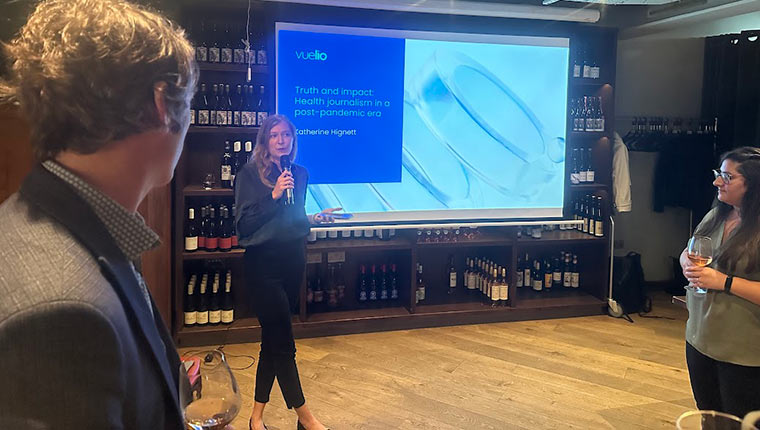How to connect with health journalists in the post-pandemic era
Just as the healthcare sector was forever changed by the impacts of the COVID-19 pandemic, so too was how the media reports on the topics of health, medicine, and treatment.
What does this mean for PRs aiming to connect with health journalists now?
Forbes.com senior contributor Katherine Hignett led Vuelio event ‘Truth and impact: Health journalism in the post-pandemic era’ on Wednesday evening, 29 May, at Vinoteca City to share her experiences and insight.
Topics covered – how health journalists became a vital force in newsrooms across the world; the challenges of sourcing trustworthy experts; and the long-term impacts still being felt in the media today.
How the pandemic changed health journalism
Extra pressures
Health journalism already comes with unique demands – ‘It’s very technical, and has regulatory frameworks other sectors don’t,’ Katherine explained – but the start of COVID-19 only brought more challenges…
Culture wars
‘Disinformation is a huge issue on social media now, and it gave us more work to do during the pandemic – debunking and extra fact-checking as part of every report. Topics that were politically inert were now potentially culturally sensitive.’
Katherine explained the impact of the rise in anti-vax sentiment, conspiracy theories, and misinformation on medications that could supposedly stop the spread.
‘When fact-checking stories, we had to personally deal with conspiracy theorists and anti-science sentiment. We got some nasty stuff from strangers over the internet. Some of these things are still with us today’.
Increased responsibility
‘Before the pandemic, the closer a story was to politics, political journalists would pick up the story. But suddenly, the expertise we had as health journalists was really important to those stories. We were suddenly among the most important journalists in the room’.
New sources
With all of the bad, came some good:
‘It was suddenly easier to get information from sources. NHS workers weren’t so open to talk to journalists before, but then, even though managers would try to stop sources in back offices from leaking information, people did it.
‘We were given amazing data on staff levels, PPE. We didn’t have capacity to cover it all.’
How to work with health journalists today
‘Covid is still something we cover everyday, even if it’s indirectly covered,’ said Katherine.
The legacy of the pandemic is also felt in how journalists source, fact-check, write, and share stories. This also impacts how they work with PRs.
Do extra checks on your experts
‘It’s more difficult to figure out who to trust when it comes to experts now,’ explained Katherine.
‘The pandemic was really good training for journalists on how to work with experts. Just because someone wears a white coat, doesn’t mean they know what they’re talking about.’
‘We often speak to them about research, and for commentary for articles. Sometimes the press can over-egg and oversell scientific findings, so genuine experts are really important.’
What is a sign of a trustworthy expert for health journalists? University affiliations. Katherine also pointed out pHd research as an interesting starting point for stories, and a way to find and connect with new experts.
Provide sources for stories
As people the world over have made efforts to return to some form of normality, so too has the status quo on sources:
‘Sadly, the sources and tips have gone back to “normal” now; it’s more tricky,’ shared Katherine.
While Katherine herself has a consumer and national focus in her work, she highlighted trade journalism’s deep connections with useful sources:
‘The trade press are really good at finding stories we wouldn’t find in consumer and on national titles, because they have access to contacts we don’t.
‘Journalists working on consumer media rely a lot on trade press, but also on releases and contacts from charities.’
What Katherine is interested in for her own reporting – drug shortages on a national scale, and health stories that reveal information that could impact society.
‘As a country, we are sicker than we were before Covid. It had a big impact on drug shortages, and exacerbated existing global issues. Many are still waiting for care that was cancelled during the pandemic. People are getting sicker and relying on medication – more pain, and more drugs, while waiting for surgery.
‘For journalists, this means there are more opportunities to hold people to account. It’s an important and fascinating area.’
Katherine Hignett is a senior contributor to Forbes.com on healthcare and health policy, and freelance journalist for titles such as Metro.co.uk and Newsweek. Katherine is a former correspondent for award-winning health policy publication the Health Service Journal, and was recognised by PressGazette for her investigative work exposing PPE shortages in hospitals during the pandemic.
To connect with health journalists working across broadcast, national and regional press, consumer and trade publications, the Vuelio Media Database and ResponseSource Journalist Enquiry Service can help.





Leave a Comment